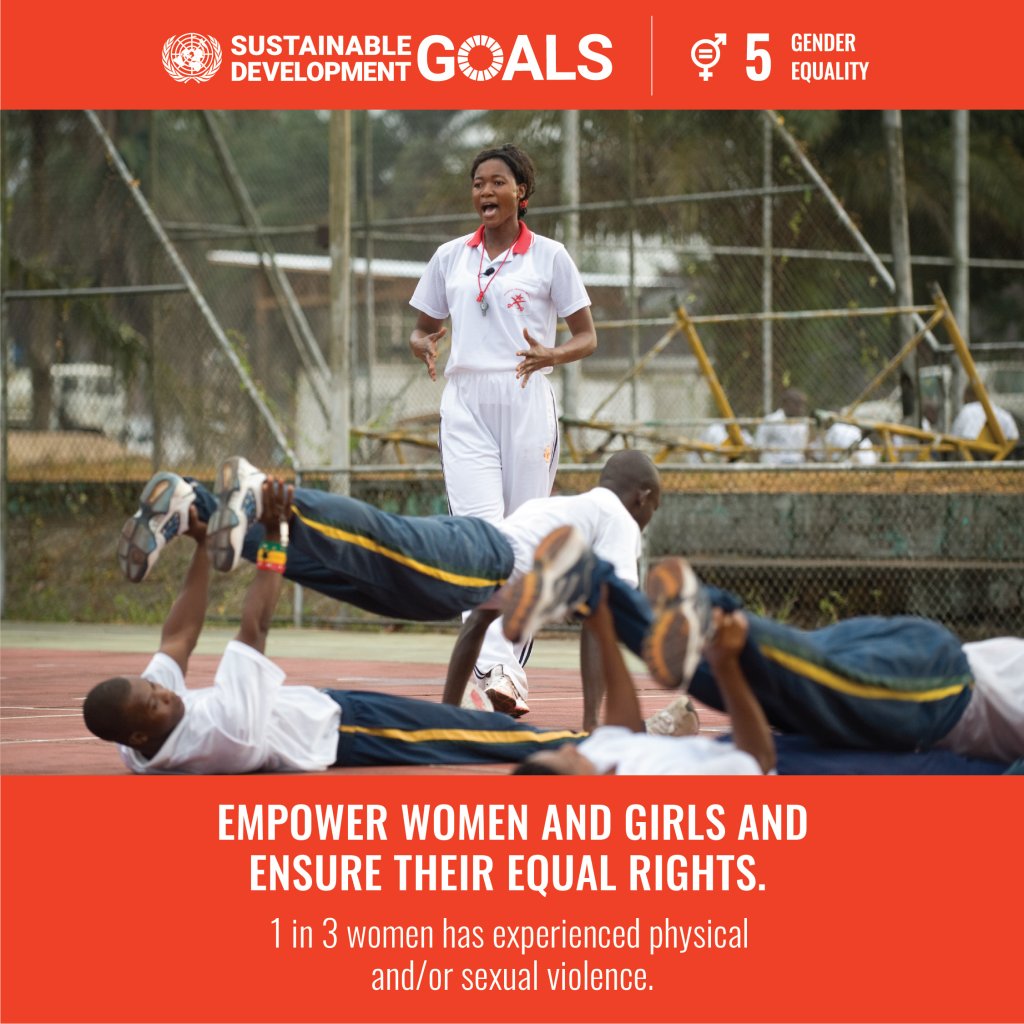
- UN Women
- He for She campaign
- United Secretary-General Campaign UNiTE to End Violence Against Women
- Every Woman Every Child Initiative
- Spotlight Initiative
- United Nations Children’s Fund (UNICEF)
- UN Population Fund: Gender equality
- UN Population Fund: Female genital mutilation
- UN Population Fund: Child marriage
- UN Population Fund: Engaging men & boys
- UN Population Fund: Gender-based violence
- World Health Organization (WHO)
- UN Office of the High Commissioner for Human Rights
- UN High Commissioner for Refugees (UNHCR)
- UN Education, Scientific and Cultural Organisation (UNESCO)
- UN Department of Economic and Social Affairs, Gender Statistics
- End all forms of discrimination against all women and girls everywhere
- Eliminate all forms of violence against all women and girls in the public and private spheres, including trafficking and sexual and other types of exploitation
- Eliminate all harmful practices, such as child, early and forced marriage and female genital mutilation
- Recognize and value unpaid care and domestic work through the provision of public services, infrastructure and social protection policies and the promotion of shared responsibility within the household and the family as nationally appropriate
- Ensure women’s full and effective participation and equal opportunities for leadership at all levels of decisionmaking in political, economic and public life
- Ensure universal access to sexual and reproductive health and reproductive rights as agreed in accordance with the Programme of Action of the International Conference on Population and Development and the Beijing Platform for Action and the outcome documents of their review conferences
- Undertake reforms to give women equal rights to economic resources, as well as access to ownership and control over land and other forms of property, financial services, inheritance and natural resources, in accordance with national laws
- Enhance the use of enabling technology, in particular information and communications technology, to promote the empowerment of women
- Adopt and strengthen sound policies and enforceable legislation for the promotion of gender equality and the empowerment of all women and girls at all levels.
Gender equality is not only a fundamental human right, but a necessary foundation for a peaceful, prosperous and sustainable world.
There has been progress over the last decades: More girls are going to school, fewer girls are forced into early marriage, more women are serving in parliament and positions of leadership, and laws are being reformed to advance gender equality.
Despite these gains, many challenges remain: discriminatory laws and social norms remain pervasive, women continue to be underrepresented at all levels of political leadership, and 1 in 5 women and girls between the ages of 15 and 49 report experiencing physical or sexual violence by an intimate partner within a 12-month period.
The effects of the COVID-19 pandemic could reverse the limited progress that has been made on gender equality and women’s rights. The coronavirus outbreak exacerbates existing inequalities for women and girls across every sphere — from health and the economy, to security and social protection.
Women play a disproportionate role in responding to the virus, including as frontline healthcare workers and carers at home. Women’s unpaid care work has increased significantly as a result of school closures and the increased needs of older people. Women are also harder hit by the economic impacts of COVID-19, as they disproportionately work in insecure labour markets. Nearly 60 per cent of women work in the informal economy, which puts them at greater risk of falling into poverty.
The pandemic has also led to a steep increase in violence against women and girls. With lockdown measures in place, many women are trapped at home with their abusers, struggling to access services that are suffering from cuts and restrictions. Emerging data shows that, since the outbreak of the pandemic, violence against women and girls — and particularly domestic violence — has intensified.
COVID-19 response
“Limited gains in gender equality and women’s rights made over the decades are in danger of being rolled back due to the COVID-19 pandemic,” the UN Secretary-General said in April 2020, urging governments to put women and girls at the centre of their recovery efforts.
Women are not only the hardest hit by this pandemic, they are also the backbone of recovery in communities. Putting women and girls at the centre of economies will fundamentally drive better and more sustainable development outcomes for all, support a more rapid recovery, and place the world back on a footing to achieve the Sustainable Development Goals.
Every COVID-19 response plans, and every recovery package and budgeting of resources, needs to address the gender impacts of this pandemic. This means: (1) including women and women’s organizations in COVID-19 response planning and decision-making; (2) transforming the inequities of unpaid care work into a new, inclusive care economy that works for everyone; and (3) designing socio-economic plans with an intentional focus on the lives and futures of women and girls.
UN Women has developed a rapid and targeted response to mitigate the impact of the COVID-19 crisis on women and girls and to ensure that the long-term recovery benefits them, focused on five priorities:
- Gender-based violence, including domestic violence, is mitigated and reduced
- Social protection and economic stimulus packages serve women and girls
- People support and practise equal sharing of care work
- Women and girls lead and participate in COVID-19 response planning and decision-making
- Data and coordination mechanisms include gender perspectives
The COVID-19 pandemic provides an opportunity for radical, positive action to redress long-standing inequalities in multiple areas of women’s lives, and build a more just and resilient world.

